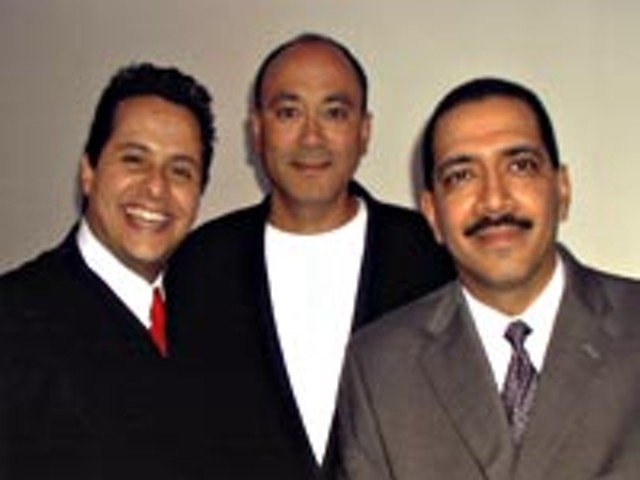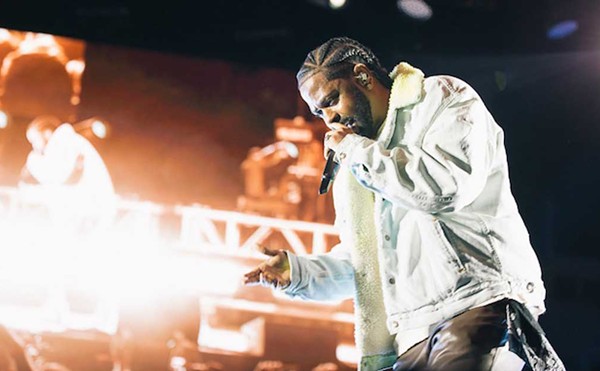Judging by the looks of the other motorists, we must make a fascinating sight. We’re barreling down southbound I-75 among a caravan of cars bringing the suburban bar crowd into the heart of downtown Friday-night hot spots. One after the other passes, guys sporting pomaded crew cuts and bought-to-be-cool club clothes, girls with tribal tats and belly shirts chomping on gum. As they pass, everyone stares.
You can’t blame them. They see a 26-year-old white guy behind the wheel of a rusted-out 1991 Ford Escort holding a Dictaphone, three days hungover and without a shave. That’s me. In the passenger seat is an obese black guy, also 26, dressed head-to-toe in fire-engine red, hair braided up in devil horns, weighing down his side of the shockless car so that it looks like it has hydraulics. That’s King Gordy.
“What I do is for people from the suburbs and people from the hood,” Gordy says. A white Explorer blasts by. The kids in the back seat look confused. In a half-stoned, lazy-eyed stare, Gordy eyes them back. “The music is just what it is. Maybe they don’t have to relate all the time. Maybe it is just good music to them. Other people listen and feel like it’s a part of their life that I’m telling.”
We merge onto I-94 east and exit at Van Dyke. Two blocks more and we’re at the infamous corner of Van Dyke and Harper, a neighborhood littered with crackheads and dealers, boarded-up storefronts and unbearably bleak, unstoppable urban decay. This is the neighborhood that Gordy loves. This is the place that all his stories are about.
Gordy navigates from the passenger’s seat with the expertise of someone who has never owned a car. As we pull deeper into his neighborhood to pick up a girl, a bag of weed and some drinks, Gordy’s mood lightens.
“I’ve been picked up in this neighborhood in BMWs and I’ve been picked up in rides like this,” he says. “It’s no big thing. I love this place. Van Dyke and Harper is why I’m here.”
It’s good to hear Gordy joking. It’s been a stressful afternoon. Since the release of Gordy’s debut full-length, The Entity, he’s been in a whirlwind of activity. Surrounded by his manager, Hex Murda and people with his label, he’s spent the day in war-room style meetings about promotional television spots, new merchandising (Gordy wants to offer fans promotional blunts, and has to be talked out of it because of legal restrictions), and logistical details concerning his upcoming tour.
But the stress isn’t just business. His friend and stage mate, DJ Houseshoes, has been bounced to the street by a sketchy landlord, Hex has started to wear a bulletproof vest under his T-shirt, attire born of his penchant for talking shit. Tomorrow Gordy will attend the burial of a friend’s brother, who was shot in the head three days earlier after a scuffle over what Gordy quietly refers to as “some shit over a female.”
The gravity of the situation brings the brutally violent scenes on The Entity into sharp focus. “Fight” deals a rapid-fire, blow-by-blow account of a street brawl in which Gordy screams jokes about bloody gums and a gang of voices howl, “Hit ’em, kick ’em, punch ’em, stomp ’em,” during the chorus. When local guest star Obie Trice complains that Gordy hasn’t killed anyone yet two tracks later (“Situations”), Gordy responds with a furious blur of violence. “Fresh flesh under my fingernails, gouging your daughter’s crotch out, your father’s knocked out,” he screams over orchestral hits and a stomping bass line. A moment later — with a dollop of sarcasm — he adds, “They don’t have a prison that can stop King Gordy from performing acts of sadomasochism.”
“I’m not worshiping the devil, I’m not doing anything like that,” Gordy says. “I’m just giving you a vivid picture of the things that are inside my mind, things that I have seen that have stayed in my mind. When I go back to where I was raised, I see people selling crack and living around morbid shit and I’m just there watching them, thinking ‘I used to do this shit.’”
The comment might set off alarms for people sensitive to straight-out-of-the-ghetto cliché, but Gordy’s story doesn’t have a single disingenuous experience. Born Berry Gordy and raised in one of Detroit’s toughest neighborhoods, he moved from school to school, dropping out in the ninth grade to sell crack in abandoned houses. He consumed images of inner city violence and disposable pop culture and processed them by spouting twisted jokes and twisted rhymes. Eventually, Detroit cops raided the house where Gordy was dealing and he landed in a Wayne Country jail, where he served nine months.
“I was in a house on Walden and Van Dyke and they got me with 16 packs of heroin in my pocket,” he says. “I was rhyming in crack houses and when I went to jail I was still writing rhymes. I got out I was still writing rhymes with a tether on, back in the crack house. I was wild and stupid. It was something that I had to go through. It didn’t shake me up; I could’ve gone through anything. I’m black, I can adapt.”
Word about him spread through the dense network of Detroit’s struggling MCs. He stopped hanging out in crack houses and started bumming rides to open mics. His dark humor and larger-than-life persona made him one of Detroit’s most distinctive unsigned artists. He signed with Web Entertainment (an independent label that released the first full-length by Eminem, Infinite, long before his Slim Shady alter ego) and started work on a record that displays “adaptability” at every turn. Based in angry, streetwise rhymes, some tracks are inflected with edgy guitars and a (strangely tasteful) heavy rock sensibility.
“Rock music has an energy and intensity that I like about it,” he says. “Like Cobain and Marilyn [Manson]. It is angry and violent. I like to make violent, morbid music and rock has that element. It is a part of me.”
While he was working on the record, things started to snowball quickly. He landed a cameo on 8 Mile, and while in and out of the same Detroit studio, Eminem started mentoring Gordy.
“Its an honor to be labelmates with Eminem,” Gordy says. “It was an honor working with him.” He’s quick to add that his sound isn’t cloned after Eminem. “One of the reasons Web liked what I was doing because it was my own. I wasn’t doing what Em was doing or what D-12 or Obie or 50 was doing. They welcomed it with open arms.”
Gordy’s decision to go with an independent label hinged on his ability to have ultimate control of the music he makes. Instead of trying to fit some mold that would appease a major label, Web gave him complete freedom without the pressure of expecting platinum record sales.
“They [record execs] take you as a new artist and try to put you into a machine,” manager Murda says. “They pay a couple bills and throw your ass against the wall hoping you’ll stick. They throw a hundred niggas against the wall every quarter and nobody sticks.”
The originality captured on The Entity coupled with Web’s production might make Gordy stick. For one thing, it sports co-writes from Eminem, a roster of guests that includes Trice (whose debut will be issued on Em’s Shady Records later this year), Bizarre of D-12 and various members of Mr. Mathers’ production team. Whether it hits or not, it might be the first record that actually presents an accurate snapshot of the local hip-hop scene — one that exists in the shadow of Eminem’s massive popularity without being directly derivative. The record doesn’t sound like Eminem.
“I want to make myself into what I am destined to be,” Gordy says. “A superstar. A rock star. Em told me, ‘I never really wanted to be as big as this but I am. I’d trade it all to be able to go to the fucking store and have people not harass me.’ But I want that shit. I want to not be able to go into stores and have millions of fans embrace me. I want the fame. And I want it my way.”
It’s easy to get an image of King Gordy as a rock star when as we run errands around his neighborhood. As evening comes down we drive a few blocks to score some weed; Gordy’s reception there is more like a long-lost friend than a customer. We hit a party store, and, as if auditioning for the role of superstar, he waits in the car and sends the girl in. His list of requests is telling: Two packs of blunts and a box of rubbers, a pack of smokes and some chewing gum. We stop and kids from the block clamor around the beat-up car, leaning in the rolled-down windows, giddy about the possibility of gaining audience with him. It’s apparent that they see him truly, the way he should be seen: he’s Berry Gordy, the undisputed East Side King.
King Gordy will perform at St. Andrew’s Hall (431 E. Congress, Detroit) with Obie Trice on Saturday, July 12. The show is an Eminem after-party beginning at 11 P.M. For more information, call 313-961-MELT.
What is Soul Purpose: Detroit Hip Hop 2003? Nate Cavalieri is a Detroit writer and musician. E-mail [email protected]





